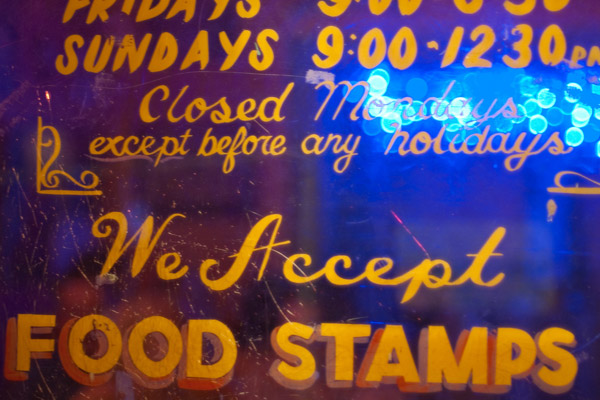
One of the issues in my household is that, being impatient and irresponsible, I tend to consume the delicious things we buy or make more quickly than my wife, who has to ask me to save her Girl Scout cookies, banana bread, or other sweets. Even things that are not delicious but have some sugar content, like Clif bars, are a sore temptation. If asked, I'll lay off. If I'm not reminded, it's a problem.
I didn't know this has public policy implications:
Families that use food stamps naturally tend to buy more food at the beginning of the month, after receiving their benefit. In fact, more than a quarter of beneficiary households redeem their entire monthly allotment within the first week of receiving it, the Agriculture Department’s Food and Nutrition Service, which oversees the SNAP program, has found. More than half the families take just two weeks to use up their full benefit. And 86 percent of families redeem more than half within the first half of the month.
That's Peter Orszag, who before his current position at Citibank and before that as the head of the Congressional Budget Office and then the Office of Management and Budget under Obama, was an economist with an interest in pensions and Social Security. One of the things he learned was that Social Security recipients tend to spend more immediately after getting their checks, and less thereafter until the next check.
This is is familiar behavior, as Carnegie Mellon analyist Melvin Stephens, Jr. wrote in 2002 regarding his research on Social Security spending (PDF): "This research question was inspired by a song titled '1st of tha Month' by the group Bone Thugs-n-Harmony. The song, which was nominated for a Grammy award in 1996 in the category of Best Rap Performance by a Duo or Group, details increased consumption during the first of each month due to the arrival of welfare checks and food stamps." It should also be familiar to anyone who buys Girl Scout cookies and doesn't freeze them like my grandmother does, or ever got an allowance as a kid, or went trick-or-treating and got horribly sick shortly thereafter
But if you apply that logic to food stamps, it has worrisome implications for families, as Jesse Shapiro (then of Harvard, now at the University of Chicago) found in 2003:
I present the first non-laboratory evidence for short-run impatience by showing that food stamp recipients are indifferent between getting one more calorie today and 0.996 more calories tomorrow. Using diary data on food consumption, I find that the average caloric intake of food stamp recipients declines by 10 to 15 percent over the food stamp month.
The problem with this should seem intuitive to anyone who's ever dealt with a hungry child (or me; paradoxically, another thing my wife has to check is, when I'm in a bad mood, if I've eaten). Orszag again:
[Lisa] Gennetian and her co-authors linked SNAP beneficiary data with disciplinary records for all fifth-to-eighth graders in Chicago’s public schools. Among students from SNAP families, disciplinary problems such as fighting, vandalism or weapons possession increased by almost 50 percent in the final week of the month compared with the first week, the researchers found. (For non-SNAP families, disciplinary events also rose, but significantly less.)
Two theories are posited: it could be a lack of food at the end of the month or a lack of resources, which is also obviously stressful. From stress follows bad judgment and disciplinary problems. One thing that took the edge off was a simple afterschool snack program. And Orzsag puts Shapiro's research and Gennetian's research together and gets the idea of dividing food-stamp payments into two per month, under the theory that would reduce the severity of the binge and the caloric tail-off that follows. It's an elegantly simple idea, and I can't help but admire that you can trace the logic back to Bone Thugs. But a word of warning: it's possible to take that approach…
He has a simple response to those who say Silicon Valley is in the midst of another bubble, including those who have criticized his firm’s large investments as having played a role in inflating the bubble. It’s LL Cool J’s song “Going Back to Cali:” “I’m going back to Cali … hmm, I don’t think so.”
“It’s totally about the way he said it — ‘Hmm, I don’t think so’ — which is how I was feeling about the bubble talk,” Mr. Horowitz said.
Listen to Genntian discuss her research on WNYC's The Takeaway:
Photograph: Mills Baker (CC by 2.0)


